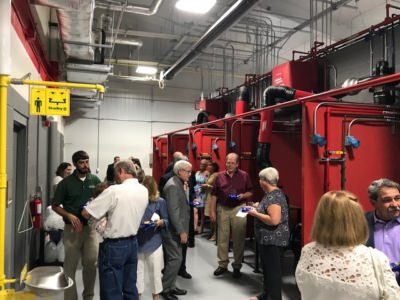Recently, a lot of attention in education policy has been focused on educational attainment and the loss points that occur along the education-to-work continuum. The economic development community has also been vocal in framing the challenge employers face in trying to fill open positions in a tight labor market. First, the challenge was described as a skills gap, then the conversation expanded to include an interest gap. The NC Chamber described it as a jobs-without-people problem.
To put the issue into perspective, 2017 survey data released by the Labor and Economic Analysis Division (LEAD) of the NC Department of Commerce showed that a majority of manufacturing and STEM employers (six in 10) responding to the questionnaire expressed difficulty in hiring skilled labor. In addition, LEAD estimated that over the next 10 to 12 years, 68 percent of all jobs will require a postsecondary credential or an associate degree or higher. This is up from 28 percent in 1973.
So how can the education community better align itself with business interests to increase the number of individuals that are prepared for employment in a knowledge economy?
One example can be found in rural Richmond County. A few years ago, Richmond County Schools (RCS) submitted a grant application to the Golden LEAF Foundation to help them implement a math remediation program targeting sixth grade students who were deemed low performing on the end of grade (EOG) math test. Jeff Epps, the lead instructor for the enrichment program, found that using 3-D modeling made it easier for students to learn math and observed that students became more engaged in the learning process.
The success of the pilot led the district to partner with Richmond Community College (RCC) in 2015 to submit a subsequent application to Golden LEAF to improve the math proficiency for students by integrating technology-rich instruction into middle and high school math classes and infuse a STEM culture to help students learn how math is applied in high-demand technical and occupational positions in the region. At that time the district’s aggregate end-of-grade (EOG) Math proficiency score for College and Career Ready (level 4 and 5) was 35.8 percent.
RCC was motivated to increase the number students in high-demand programs such as mechanical engineering and machining because area employers were desperate for skilled workers to fill a number of open positions and summer internships. The problem the college faced was that too many students who were interested in these programs were unable to meet the math placement scores and were thus required to first complete noncredit math remediation courses before they could enroll in a program. Data shows that students who are required to complete noncredit remediation courses prior to entering a program typically drop out and never enroll in a program of study in college.
Under the direction of RCC’s President Dale McInnis and Richmond County School Superintendent Cindy Goodman, a partnership formed to craft a comprehensive plan to close the math proficiency gap so more students could successfully transition from high school to college without first having to take a noncredit math remediation course. Their plan used a STEM-based, technology-rich approach to teaching math that included intensive professional development for teachers delivered by Discovery Ed, NC State’s Friday Institute, and RCC’s math department.
Math teachers from RCS participated in externship experiences to learn how math was applied in careers aligned to industry employment needs. During the externships, RCS and RCC math teachers worked with engineering technology and nursing instructors to develop math lessons focused on those fields to demonstrate real-world and real work applications of math. These lessons were then used in math classes to help students master computational skills through applying math to solve work related problems. In addition, summer camps and Saturday Academies were held at RCC’s campus to expose students to career pathways and provide rich learning experiences where students were challenged to apply mathematical concepts to solve real-world challenges.
The results have been impressive. Enrollment in RCC’s summer camps increased 231 percent from 2016 to 2017, with all camps reaching capacity in 2017. Participation in the Saturday Academy grew from an initial seven students in 2016 to the maximum allowed, 40 participants, in 2017. Enrollment for the Academy is currently full, and there is a waiting list. In fact, local demand for extracurricular STEM activities has exceeded the partners’ current capacity. Math achievement scores have also increased with Math I college and career readiness (level 4 and 5 achievement) scores growing from 48.4 percent in 2014-2015 to 77.1 percent in 2017-2018. This moved RCS to a first-place ranking among the state’s 115 school districts this past year. The joint effort has also increased the number of high school students taking college classes through the Career and College Promise Program by 99 percent (from 231 in 2014 to 460 in 2018).
The initiative is also paying economic dividends. Charlie, a student in Mr. Epps initial 3-D modeling course, recently completed his master’s degree in biology from NCSU and has returned to teach science in one of the district’s middle schools. A second member of that cohort completed a degree in simulated gaming from Sandhills Community College. Ty returned home to take a CTE position at Richmond Senior High where he teaches Scientific Visualization. Another member of that group attended Fayetteville State University after graduation where he studied geography. Tyreek is now an intern with the NC Department of Transportation. Ben participated in the enrichment programs as a Richmond Early College student. He graduated from the early college with an Associate in Arts degree, but decided not to transfer to a university. Rather, he chose to stay home where he began helping Mr. Epps and the other camp facilitators to keep the 3-D printers and other technology operational. In 2015, Ben was hired by 3-D Systems in Rock Hill, SC where he now works as an applications engineer.
The collective effort of the community college and RCS is working to address loss points in the education-to-work pipeline. Student achievement has improved, more students are earning college credit prior to graduation, and graduates are better prepared with the skills and knowledge that area business and industry partners need to grow. The partnership between Richmond Community College and Richmond County Schools should be celebrated as a clear example of the great work that our community colleges and public schools are doing to help fuel the talent needed by business and industry to remain and grow in rural communities across NC.
Recommended reading



